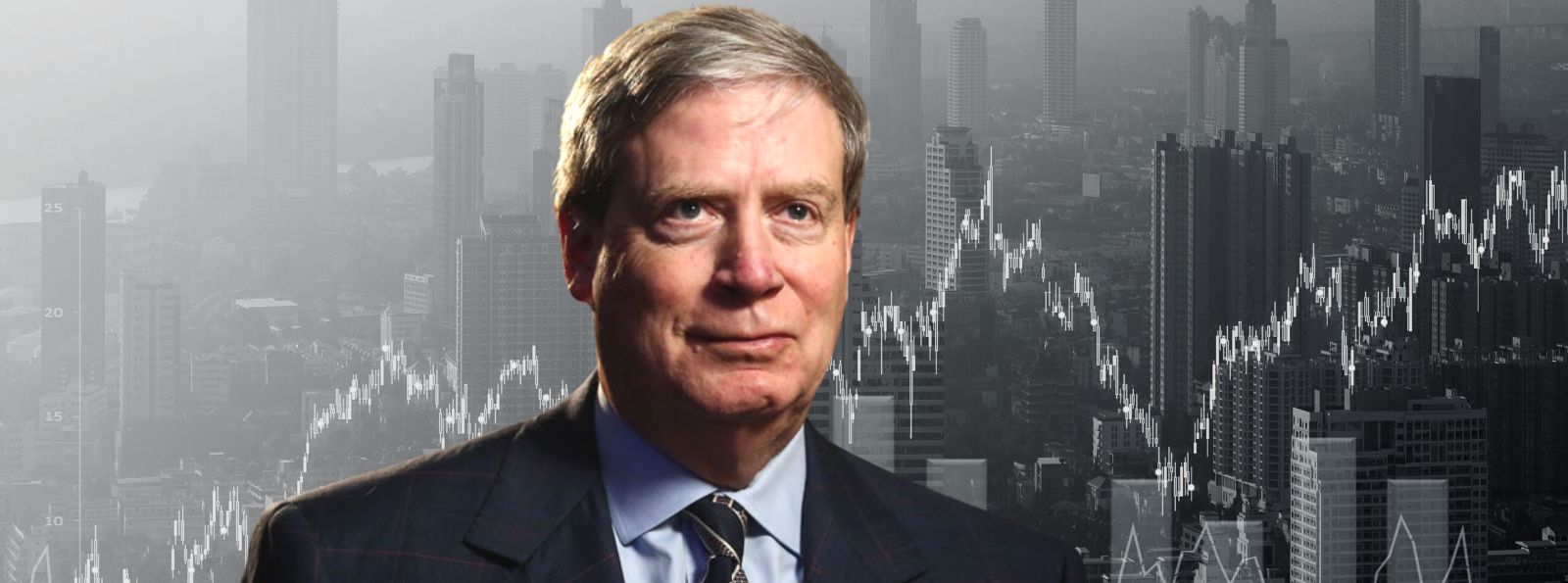Stanley Druckenmiller's only high conviction trade is against the US dollar
Renowned hedge fund manager Stanley Druckenmiller argues that today's market environment is the most difficult he's witnessed in 45 years. And although he admits he would like to be sitting on cash, the self-confessed "junkie" continues to exploit market opportunities today.
Speaking at the Norges Bank Investment Management (NBIM) Annual Investment Conference on April 25, and interviewed by NBIM CEO Nicolai Tangen, Druckenmiller shared a play-by-play of his read on the market.
"The Druck", as he is affectionately known in markets, is not seeing a lot of "fat" in fixed income, equities are "really complicated", and he's short the US dollar. Currently, his equity allocation is 3% net short.
For those that don't know, Druckenmiller is widely considered one of the world's most successful investors.
He started his career in 1977 at his local Pittsburg National Bank in Pennsylvania, and just four years later, would go on to found his own firm, Duquesne Capital Management. Later, he would work with George Soros for the Quantum Fund, where the pair infamously "broke the Bank of England" by betting against the British pound.
After leaving Soros behind in 2000 (after heavy tech losses), Druckenmiller built his reputation as a multi-asset force to be reckoned with, delivering investors returns of around 30% per annum over the Fund's 30-year run. He closed the Fund in 2010 and returned shareholder's savings. Today, he managing his own riches (which is around $2 billion, for those wanting to know).
In this wire, you'll learn how "The Druck" is navigating markets, his outlook for investors over the months and years ahead, as well as why he doesn't have a lot of faith in the Fed.
.jpg)
"These days, things are a lot more complicated"
"I've been doing this for 45 years. I've studied a lot of economic history, but I've never had a situation where you've had free money for 11 years, a very broad asset bubble followed by jacking up rates 500 basis points in 12 months," he says.
"For someone like me who likes to look at history and come up with potential scenarios, this is a particularly difficult period."
Druckenmiller is famous for his top-down approach on a range of five to six asset classes - of which he combines long and short positions at various times.
"That tends to keep me out of trouble in terms of playing in an area where I shouldn't be playing at a particular time," he says.
"And I think it's one of the most important things to do - is not to play when you don't see a fat pitch."
Right now, he doesn't see a "fat pitch" in fixed income. That said, he is invested in Japanese Government Bonds.
"I don't know whether I'm going to get paid or not, but I think the risk/reward is ridiculous. It reminds me a little of two years ago," he says.
Druckenmiller also believes the US is likely to sink into a recession later this year.
"Again, this is so complicated. I'm not willing to place a big bet and even if I believe in a hard landing, which I do, what do you do with two-year treasuries at sub-4% with Fed funds at 5.25%? I'd better be right about my hard landing if I want to own fixed income," he says.
Similarly, long-term fixed income instruments aren't looking particularly attractive, he argues.
"If I believe we're [going to see a] hard landing, I'm supposed to own bonds, but they're not exactly a screaming bargain, [with] 10-Year Treasuries at 3.5% in the US, particularly with a Fed that has certainly shown some metal in the last year," Druckenmiller says.
He adds that he was "unnerved" by the Fed's response to the Silicon Valley banking crisis.
"In four days they printed enough money - they basically wiped out the entire reduction of the balance sheet they had done for five or six months," Druckenmiller says.
"If I'm trying to look ahead and anticipate, I don't have a lot of faith in these guys, should we get into a hard landing that they're going to hold the line and not do something maybe worse than Arthur Burns*."
"But let's just say we're going to have a hard landing and a bad recession in the US. What does that mean for Nvidia (NASDAQ: NVDA)?" He asks.
"I don't know. I mean, oils and chemicals went up in '73 and '74, and staples have gone up in bad recessions in the US historically. What do I do with a company, if you have a bad recession in the US, but it's growing wildly throughout that period because we have an arms race going on in its space? It's not clear to me it goes down."
That said, one area of the market he does feel comfortable investing in today is shorting the US dollar - noting it's the only trade that he is currently "risk on" right now.
"Currency trends tend to run at least two or three years. We had a long one here, over US$10 trillion to something like US$13 trillion came into the US dollar during the previous decade," he says.
"I will say, full disclosure, I missed the dollar. [It was] probably the biggest miss of my career in currency trade. I missed the last nine months' run-up in the dollar. I just couldn't bring myself to own Joe Biden and Jerome Powell.
"But I think now that on a relative basis, the tightening in the US going forward will not be as much as the foreigners now that we've weaponised the dollar."
He warns investors against doing the same, noting that he could change his mind within the week.
"I'm also on gold, obviously, for the same reasons," Druckenmiller adds.
"When you really see the ball, swing really big"
When he was managing other investors' money, and reporting annual performance figures, Druckenmiller's Duquesne Capital delivered returns of more than 30% per annum for 30 years.
For context, the market's average return over the long term is generally considered to be around 8-9%. Most hedge funds target returns in this ballpark.
"It's just mathematics," he says. "If you go down 50%, you have to go back 100% to get it back to even."
"I've always thought the way to build a long-term track record is when you really see the ball, swing really big. And when you don't see the ball, don't swing."
Interestingly, Druckenmiller reveals that he doesn't conduct vast amounts of analysis before taking on new positions - particularly now, with markets moving at lightning speed.
"I've heard a saying, 'With analysis comes paralysis'. Soros used to say, 'Invest and then investigate', which I was already doing before I met him. But it's more important now than it was then," he says.
"We're in such a fast-moving world with all the new communications that if I get an idea and I think it's attractive and for whatever reason that security price will be higher in a year or two, I generally go ahead and buy it and then tell the analyst to look into it.
"If it turns out I was wrong after they analyse it, I get out. I don't like to wait around."
He humbly admits to being "not that smart" (lies), and fears that if he doesn't jump on an idea straight away, someone else could.
"And then I'm paralysed because it just went up 30% or 40% and I don't have the guts to buy it even if I think it's going higher," Druckenmiller says.
"We're more in the camp of if we got a strong feeling, we'll cut the analysis short and then, by all means, do our analysis thoroughly and then just unload it if it turned out my thesis was wrong."
"If I've got a thesis and it's really bullish and it's playing out and the stock's not going anywhere, it makes me go back and check the thesis over and over," Druckenmiller says.
"But price action versus news is not what it used to be 20 or 30 years ago, probably because the competition has learned the same game. Whereas when I got into the business, you didn't have that many people that had it as that big a part of their process."
"Be patient" over the next two years
While Druckenmiller continues to believe that the market will be higher in 10 years' time, he notes that it will likely be incredibly volatile along the way.
"Like the '68 to '82 period, we'll have some big swings," he says.
"I think the way to make money in the next two years in the equity space is to be patient. I do think we have possibly some rough roads ahead. And I do think the central bank will respond in some crazy way that will give you a period like '70 to '72, when you can make money, or '76 to '78 when you could have made a lot of money."
He also believes currency markets will be "very interesting" over the next two years.
"I think this is a movie I've never seen anything like," Druckenmiller adds.
"I'm going to be very careful not to dig myself into a hole when I don't have a strong belief to come out [with a major call] because I think the opportunities are going to be amazing as this movie unfolds in the next year in macro and in equities."
*Arthur Burns was a former chairman of the Federal Reserve between January 31, 1970, and March 8, 1978. He's infamously referred to as the "worst" Fed chair in history, after pursuing a "stop-go" interest rate policy to tackle inflation (which failed) during the 1970s.
4 topics
1 stock mentioned

